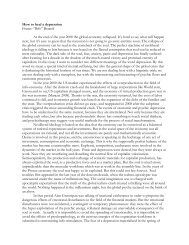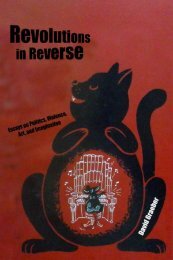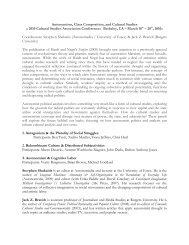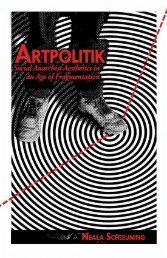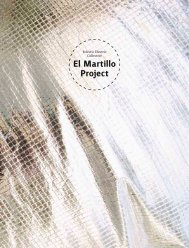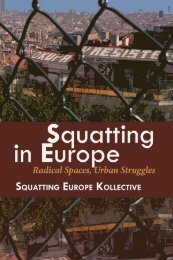nanopolitics handbook - Minor Compositions
nanopolitics handbook - Minor Compositions
nanopolitics handbook - Minor Compositions
Create successful ePaper yourself
Turn your PDF publications into a flip-book with our unique Google optimized e-Paper software.
that radicality (the radicals playing with rules, reinventing them) emerges exactlythere, from this uncontrollability of words bodies and emotions. Thereis no clear intentionality, no conclusion, no solution, but we are sharing a lot,even understanding something may be’ (Gabriella Alberti).And in the notes to Hagit’s voice-session, we read: ‘The first one was an exercisewhere we had to start on the floor and slowly go to a standing positionmoving in whatever way we wanted. At the same time, as we were doing thisHagit asked us to sing a song we knew from our youth and start on the floorsinging in our lowest voice and as we slowly stood up we were to increase thepitch of our voice. It was very interesting to experience the whole range ofnotes that we could go through although I have to say that I felt very self-consciousand didn’t really let myself go.’ I strongly resonated with this experiencein the session I attended. We saw a movie and touched and pulled and pushedour skins, and closed our eyes, and moved in unison and apart, we discussedthe privilege of the space, but also spoke of the necessity of constructing it,that without such experimentations in movement, sensation, and politics wewould know less well what we as a revolutionary movement, and as individual-collectivebodies can do.In different ways, <strong>nanopolitics</strong> experimented with creating haptic spacesof sonorous intensities. Deleuze and Guattari write of smooth space filled byevents or haecceities, far more than by formed and perceived things. A spaceof affects, more than one of properties; in it a haptic, synaesthetic rather thanoptical perception is necessarily active. A space of emergent forms, or morphogenesis,nanospaces diagram material forces. A monstrous logic of the‘and’. ‘It is an intensive rather than extensive space, one of distances, not ofmeasures and properties. Intense Spatium instead of Extensio. A Body withoutOrgans instead of an organism and organization’. 8 In such spaces of experimentationperception is based on symptoms and evaluations rather thanmeasures and properties; its topological surface occupied by nothing but intensities,‘wind and noise, forces, and sonorous and tactile qualities, as in thedesert, steppe, or ice. The creaking of ice and the song of the sands. Striatedspace, on the contrary, is canopied by the sky as measure and by the measurablevisual qualities deriving from it’. 9 For me the incident between our group(some of whom were white, some not) and the security guard who was of colorand non-elite, brought me to the complex striation of our common spaceand its attendant habituations, constantly impinging on our practices and desiresfor autonomous conjunctions. This did not diminish the experiment forme, but rather urged in me a sensibility of complexity and overdeterminationin a moment both enabled and modulated by a corporate, digitized institutionsuch as the neoliberal university.227




